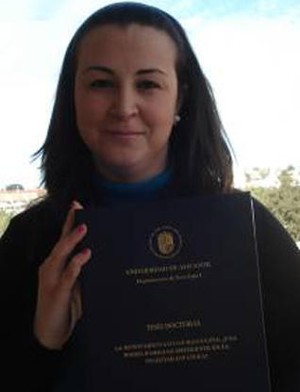
Manuela Avilés Hernández, professor in the Department of Sociology and Social Work from the University of Murcia has recently obtained the Prize of the Congress of Deputies in the specialty of Political Science and Sociology for his doctoral thesis: “The male single parents: A familiar form emerging in the Spanish society?” (Concession). The thesis was directed by Carmina Pérez Pérez, professor of Sociology of the same university, and defended at the University of Alicante, where he completed the doctorate.
The Congress of Deputies, grants awards to the thesis of your interest related to the fields of Law; Political Science and Sociology, Economics, and Journalism. After four years of research, Manuela Aviles has gotten his doctoral thesis on single-parent families male has been recognized with one of the prizes of the Congress of Deputies. Manuela is convinced that the family roles are changing.
In the last Spanish Congress of Sociology (July 2013), Manuela Aviles presented the communication “How are single-Parent Families Male in Spain? An approach to the study of their socio-demographic characteristics” in the Group Work Sociology of the Family (GT 3). Reading your abstract, we can make a first approach to the work of Manuela:
At the end of the seventies, several researchers began to observe, through statistical data available, that single-parent families male of various countries, such as united States, Australia, Canada or England, were increasing significantly and, in addition, at a rate higher than that of their female counterparts. This increase was seen in the number of single-parent households male made that the scientific interest and social these family groups began to increase. Studies that were carried out was portrayed in a way quite matching their social reality and family. With regard to the father, they concluded that the educational level, professional status, and even income were, on average, higher than those who were parents of household two-parent, although the problems, mainly economic, faced by single-parent families women were beginning to appear in the male. In the workplace, the parents retained the same job they had before the start of single mothers, although in most cases they had had to adapt their work in some way, by reducing, for example, the number of hours worked. With respect to their age, were in a range between 30 and 54 years, being divorced or separated parents younger than widowers. In relation to children, the studies indicated that parents were more likely to assume the care of their male children and teens, many times at the request of the children themselves.
If we focus on the concrete case of Spain, there are a number of issues: what is happening in our country? what are increasing here also single-parent families male?, does your pace of growth, on the assumption that one exists, is superior to that present in the feminine?, how are these households?, what are headings in most of the cases by a man divorced or separated?, how the children are, as in other countries, mainly boys, and adolescents?, etc Are many questions that arise and that have no answer, because in Spain it has never addressed the specific study of the Male single parents. We have only made small contributions on their characteristics but they have always been in comparative terms with respect to single-parent families female.
Trying to give response to this lack of information, on the Male single parents, there is in our country, has made a quantitative analysis on single-parent households male from Spain, taking as a reference the data from the Active Population Survey, corresponding to the 4th quarter of the year 2011. It thus provides detailed information about how they are and what profile have Spanish households in which it is the man in charge of taking care of their dependent children without the presence of a maternal figure. This analysis seeks to determine if there are certain similarities between single-parent households male from Spain and other countries.
Below we reproduce an article published recently in Public.it is where we can learn more details of the work of Manuela Aviles. At the end of the attached article also links to two interviews in two different media.
